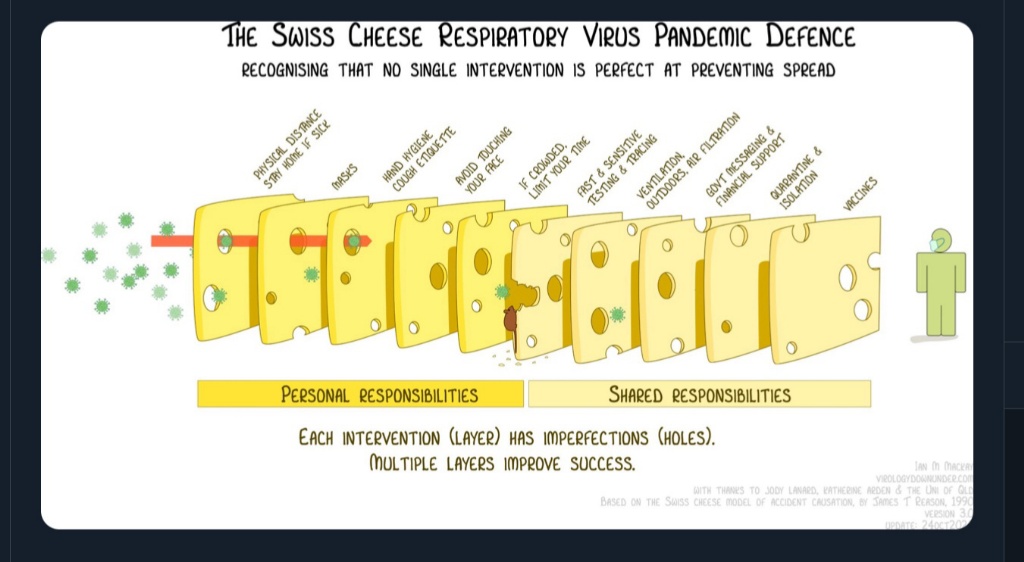This is such a useful visualisation by Ian M. Mackay making the point that there is no single way of being sure that you’ve stopped the virus getting through.
Quote of the Day
“Meanwhile, Twitter and Facebook said at the weekend they would transfer control of the @POTUS account, the official one for the US president, to the Biden administration on January 20.”
- Financial Times
Musical alternative to the morning’s radio news
Handel: Where’er you walk | Semele HWV 58 / Act 2 | Bryn Terfel
tl;dr: An AI that sums up research papers in a sentence
From Nature.
The creators of a scientific search engine have unveiled software that automatically generates one-sentence summaries of research papers, which they say could help scientists to skim-read papers faster.
The free tool, which creates what the team calls TLDRs (the common Internet acronym for ‘Too long, didn’t read’), was activated this week for search results at Semantic Scholar, a search engine created by the non-profit Allen Institute for Artificial Intelligence (AI2) in Seattle, Washington. For the moment, the software generates sentences only for the ten million computer-science papers covered by Semantic Scholar, but papers from other disciplines should be getting summaries in the next month or so, once the software has been fine-tuned, says Dan Weld, who manages the Semantic Scholar group at AI2.
You can test it by submitting an Abstract of a paper here.
I tried it, by feeding it the Abstract of the landmark 2013 paper by Michal Kosinski, David Stillwell, and Thore Graepel, “Private traits and attributes are predictable from digital records of human behavior”, which reads:
We show that easily accessible digital records of behavior, Facebook Likes, can be used to automatically and accurately predict a range of highly sensitive personal attributes including: sexual orientation, ethnicity, religious and political views, personality traits, intelligence, happiness, use of addictive substances, parental separation, age, and gender. The analysis presented is based on a dataset of over 58,000 volunteers who provided their Facebook Likes, detailed demographic profiles, and the results of several psychometric tests. The proposed model uses dimensionality reduction for preprocessing the Likes data, which are then entered into logistic/linear regression to predict individual psychodemographic profiles from Likes. The model correctly discriminates between homosexual and heterosexual men in 88% of cases, African Americans and Caucasian Americans in 95% of cases, and between Democrat and Republican in 85% of cases. For the personality trait “Openness,” prediction accuracy is close to the test–retest accuracy of a standard personality test. We give examples of associations between attributes and Likes and discuss implications for online personalization and privacy.
The ‘generated TLDR’ reads:
“We show that easily accessible digital records of behavior, Facebook Likes, can be used to automatically and accurately predict a range of highly sensitive personal attributes including”
That’s not a demanding test, because the Abstract is a good summary of the paper. It’s be better to test it on more abstruse stuff — like preprint Abstracts in arXiv.org. Still… I can see it being useful for busy bloggers who aspire to curation!
Australian predictive policing tool for kids
Great blog post by Cory.
Predictive policing tools work really well: they perfectly predict what the police will do. Specifically, they predict whom the police will accuse of crimes, and since only accused people are convicted, they predict who will be convicted, too.
In that sense, predictive policing predicts “crime” – the crimes that the police prosecute are the crimes that the computer tells them to seek out and make arrests over. But that doesn’t mean that predictive policing actually fights actual crime.
Instead, predictive policing serves as empirical facewash for bias. Take last year’s biased policing statistics, give them to a machine learning model, and ask it where the crime will be next year, and it will tell you that next year’s crime will look much the same.
If the police then follow the oracle’s bidding and patrol the places they’re told to patrol and stop the people they’re told to stop, then yup, they will validate the prediction. Like all oracles, predictive policing only works when its self-fulfilling prophecy.
Michael Lewis: Why I live in Berkeley
Lovely little piece by one of my favourite writers. If I had to live in California I’d live in Berkeley too. Though I’d also like to have a weekend cottage in Carmel.
Hindsight: the only exact science
Steven Sinofsky used to be a senior Microsoft executive and is a knowledgeable blogger.
This blog is also available as a daily email. If you think this might suit you better, why not subscribe? One email a day, delivered to your inbox at 7am UK time. It’s free, and there’s a one-click unsubscribe if your decide that your inbox is full enough already!


